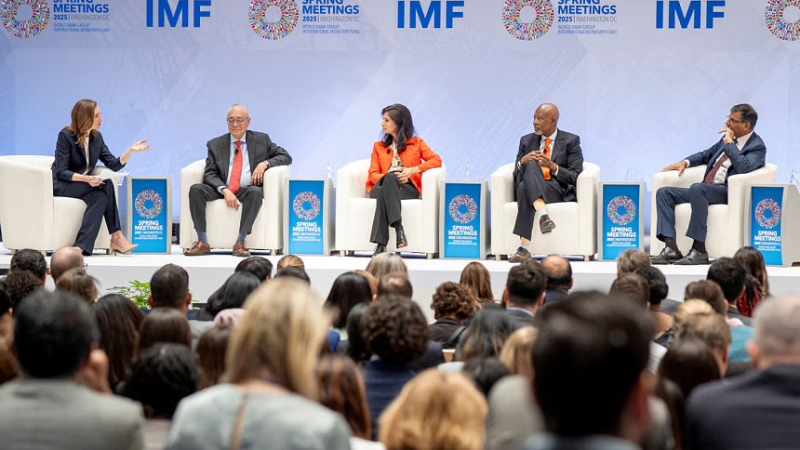- Intimidation or bloodshed cannot halt Bangladesh’s march to democracy |
- Khaleda Zia integral to an important chapter in BD history: Yunus |
- Enthusiasm marks Victory Day celebrations across Bangladesh |
- Dhaka-Delhi ties deep; to be shaped by trust, dignity, mutual respect |
- EU deploys election observation mission to Bangladesh |
IMF-World Bank Meetings End with Uncertainty on Tariffs

Global finance leaders gathered in Washington last week, hoping to gain clarity on how President Donald Trump's aggressive tariff policies would affect the global economy. However, most returned home with more questions than answers.
Participants at the International Monetary Fund (IMF) and World Bank Spring Meetings expressed frustration over the lack of definitive action from the US. Many had sought meetings with US Treasury Secretary Scott Bessent and other senior officials but were met with little more than requests for patience, despite the looming deadline for a 90-day pause on tariffs.
Despite extensive negotiations and receiving 18 written proposals, no agreements were reached, and the Trump administration made it clear that they were not yet ready for negotiations. "We are not negotiating. We are just presenting, discussing the economy," said Polish Finance Minister Andrzej Domanski, who warned of the global damage uncertainty brings.
The Trump administration has imposed tariffs of 25% on US imports of vehicles, steel, and aluminum, with 10% tariffs on many other goods. These moves are expected to have a significant impact on the economies of both the US and its trading partners. Domanski expressed concerns, noting that while US officials believe the pain will be short-term with long-term benefits, the reality may involve extended hardship.
The week’s most substantial trade talks focused on Japan and South Korea, but no concrete results were achieved. US officials indicated that currency policies of both nations would be part of future discussions, with the US eyeing weaker currencies as a barrier to American exports.
The IMF's outlook was slightly more optimistic, reducing growth forecasts for most countries but refraining from predicting recessions for major economies, including the US and China. IMF Managing Director Kristalina Georgieva acknowledged the uncertainty facing the global economy, urging for swift resolution of trade disputes to lift the shadow of tariffs. "Uncertainty is really bad for business," she said.
However, several finance officials expressed concerns that the risk of recession was higher than the IMF's forecasts suggested. Eric LeCompte, executive director of Jubilee USA Network, noted that the week’s discussions had yielded little progress on crucial issues like debt crises. There was a strong sense of frustration, particularly among developing countries, that the focus was on tariffs rather than financing for development.
The World Bank also sounded the alarm on rising debt levels in emerging markets, noting that the slowdown in trade and foreign direct investment due to tariffs was hurting developing economies. World Bank chief economist Indermit Gill recommended that countries cut their own tariffs to boost growth prospects.
While there were concerns about rising global debt, there was a brief moment of relief when Bessent affirmed the US's support for the IMF and the World Bank, though he criticized the institutions for expanding their missions into areas like climate change, gender, and equality. Rather than following through on proposals to withdraw from these institutions, Bessent suggested a refocus on their core economic stability and development missions, with a focus on energy financing and ending loans to China.
Despite some positive signals early in the week about possible negotiations to ease tariffs, confusion mounted as China denied that talks were underway with the US. "I think most people left here bracing for things to get worse from an economic perspective," said Josh Lipsky, a former IMF adviser now with the Atlantic Council’s GeoEconomics Center.
The week concluded with growing concerns about the US economic leadership. A recent sell-off in US Treasury debt and dollar-based assets raised questions about trust in US policies, with some trading partners seeking alternatives to the dollar. As Lipsky noted, while the US economy is too large to be ignored, the erosion of trust could lead to long-term shifts in global financial dynamics.

